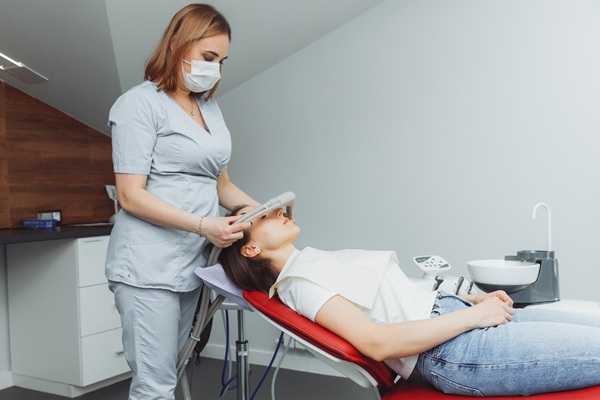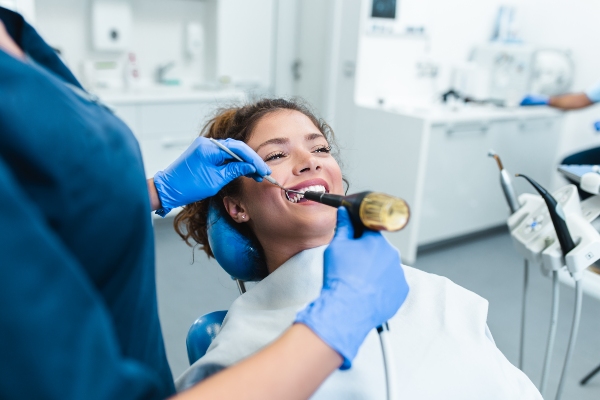4 Aftercare Tips for Your New Dental Filling

A dental filling is often used to treat cavities. It is one of the cheapest treatments performed by dentists, and, when properly maintained, certain types of fillings can last up to 10 years. This article will explore ways to take proper care of your dental fillings so that you get the most out of them.
How a dental filling is installed
Getting dental fillings usually takes less than an hour per tooth. The dentist starts off by injecting a local anesthetic into the area surrounding the affected tooth. The dentist will then remove decayed tooth material from the cavity.
The moldable filling is pushed into the hole and it fills up the entire cavity. The filling hardens when exposed to saliva or air. If a composite resin is used, the dentist will harden it with a UV light. It is normal to experience some tooth sensitivity immediately after getting fillings, but that goes away after a few days.
4 Ways to care for a dental filling
Getting a dental filling brings relief from the symptoms of cavities, like toothaches and sensitivity. Here is what patients should do after fillings have been installed:
1. Wait until the anesthetic wears off
As we mentioned earlier, the dentist will inject the patient with an anesthetic during the procedure. The medication might not wear off until hours after the procedure. It takes away the patient's ability to feel things in their mouth and that can lead to injuries if they try eating before they regain their ability to feel.
2. Avoid putting pressure on the tooth for a day
If possible, patients should refrain from chewing directly with the newly-repaired tooth. It might put unnecessary stress on a filling that is not fully hardened yet.
3. Practice good oral hygiene
Fillings do not require any special care. Brushing and flossing are all it takes to get the most out of this treatment. Patients are advised to brush at least two times a day. Brushing before going to bed is particularly important since bacteria do more damage while a person sleeps. This is due to the decreased saliva production that occurs during sleep. Saliva serves as a natural cleaner that removes bacteria and the acids they produce from teeth surfaces. Brushing before going to bed significantly reduces the damage done at night.
People who have a history of dealing with cavities should consider using a mouthwash that contains fluoride. Fluoride helps to mineralize tooth enamel, which protects against tooth decay.
4. Do not suck on teeth
Some people habitually suck on their teeth and that is not good for dental fillings. Over time, it can lead to the fillings becoming loosened or even coming out. The patient will need to get another filling or risk the cavity becoming larger.
Fillings keep cavities from turning into something worse
Cavities should never be ignored because they will turn into something more serious or, eventually, lead to the loss of the tooth. Contact our clinic today for a consultation.
Request an appointment here: https://www.ohiocosmeticdentists.com or call Ohio Cosmetic Dentists at (614) 503-5240 for an appointment in our Columbus office.
Check out what others are saying about our services on Yelp: Read our Yelp reviews.
Recent Posts
Are you concerned about whether or not you will receive painless dentistry at your next appointment? You aren't alone. In fact, many people every year simply avoid the dentist altogether out of fear that they will have a painful experience. Unfortunately, for some people, they have already had a negative experience, so it's even more…
For healthy teeth and gums, routine dental care is necessary. For most healthy people, two times a year is the recommended frequency for dentist appointments. This is typically adequate for deeper cleaning and preventive care. However, for some patients, more frequent appointments are necessary to manage certain issues and to prevent problems from becoming more…
Endodontics is a branch of dentistry dedicated to saving teeth by treating problems inside the tooth. It focuses on the health of the tooth's pulp and roots, essential to your smile's overall strength and function. Endodontics could be the key to relieving discomfort and preserving your natural teeth if you are experiencing tooth pain or…
Maintaining routine dental care is important for oral and overall health, but many patients have questions about what it consists of beyond daily brushing and flossing. The right answers can help patients of any age understand the importance of providing optimum care for their teeth and the possible issues if they fail to follow through.…


